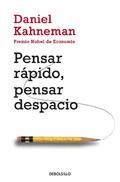Zéro Janvier a publié une critique de Thinking, fast and slow par Daniel Kahneman
Review of 'Thinking, fast and slow' on 'Goodreads'
3 étoiles
J'avais entendu parler à plusieurs reprises, toujours de façon positive, de ce livre de Daniel Kahneman. J'ai fini par me laisser tenter et je viens de le lire.
Dans ce long essai, l'auteur expose le fruit de ses longues années de recherche en psychologie, autour du thème de la prise de décision. Son propos s'articule autour de la distinction entre deux "systèmes", deux modalités de décision dans notre cerveau :
Le Système 1 est intuitif, rapide, mais soumis à des biais, des stéréotypes, des approximations, influençable par les circonstances, et donc capable d'erreurs de jugement.
Le Système 2 est analytique, précis, mais plus lent et parfois "paresseux" quand il valide les intuitions du Système 1 sans procéder à une analyse plus détaillée.
L'auteur détaille évidemment les caractéristiques de ces deux systèmes, sur le mode de fonctionnement, les avantages et les inconvénients de chacun. Il approfondit ensuite en exposant longuement les …
J'avais entendu parler à plusieurs reprises, toujours de façon positive, de ce livre de Daniel Kahneman. J'ai fini par me laisser tenter et je viens de le lire.
Dans ce long essai, l'auteur expose le fruit de ses longues années de recherche en psychologie, autour du thème de la prise de décision. Son propos s'articule autour de la distinction entre deux "systèmes", deux modalités de décision dans notre cerveau :
Le Système 1 est intuitif, rapide, mais soumis à des biais, des stéréotypes, des approximations, influençable par les circonstances, et donc capable d'erreurs de jugement.
Le Système 2 est analytique, précis, mais plus lent et parfois "paresseux" quand il valide les intuitions du Système 1 sans procéder à une analyse plus détaillée.
L'auteur détaille évidemment les caractéristiques de ces deux systèmes, sur le mode de fonctionnement, les avantages et les inconvénients de chacun. Il approfondit ensuite en exposant longuement les différents biais et phénomènes auquel le Système 1 est soumis et qui peuvent l'amener à se tromper.
Le contenu est souvent très intéressant, avec de nombreuses expériences qui illustrent le propos, mais l'auteur a tendance à être un peu bavard et à se répéter, ce qui peut rendre la lecture un peu laborieuse et rébarbative. Il faut soit prendre son temps entre chaque chapitre, soit au contraire passer rapidement certains passages qui ne font que reformuler des concepts déjà exposés quelques pages auparavant. Le début, quand l'auteur présente les bases de sa réflexion autour des deux systèmes, est passionnant et limpide. La suite est un peu moins plaisante, alternant des passages passionnants et d'autres plus laborieux. C'est en tout cas l'expérience de lecture que j'ai eu ces derniers jours.
L'ensemble est tout de même très intéressant et éclairant sur un sujet captivant et souvent méconnu. J'espère en avoir retenu une part conséquente, cela peut toujours être utile !

